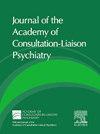阿尔茨海默病与血液系统恶性肿瘤患者照护者预期悲伤的比较研究。
IF 2.5
4区 心理学
Q2 PSYCHIATRY
Journal of the Academy of Consultation-Liaison Psychiatry
Pub Date : 2025-07-01
DOI:10.1016/j.jaclp.2025.04.003
引用次数: 0
摘要
背景:预期悲伤(AG)是一种常见的经验,影响慢性疾病患者,特别是阿尔茨海默病的护理人员。导致社会性死亡的认知障碍对两性关系产生更大的影响,从而对AG的影响大于身体障碍。目的:本研究的目的是研究与血液恶性肿瘤(HM)相比,阿尔茨海默病(MNCD-AD)所致的严重神经认知障碍患者护理人员中AG的患病率和严重程度,并确定与AG相关的特征。方法:共132对夫妇(患者及其照顾者)完成了预期悲伤、照顾者负担、焦虑和抑郁症状以及精神状态的测量。结果:MNCD-AD组显著性AG的点患病率为57.6%,HM组为51.5%。两组间AG严重程度差异无统计学意义(分别为;48.77±17.98 vs 44.18±15.57)。然而,MNCD-AD组的个人牺牲负担明显更高(p= 0.043)。照顾者的AG严重程度与MNCD-AD患者的照顾者负担(r= 0.735)、认知能力下降(r= 0.575)和神经精神症状(r= 0.627)相关。结论:研究结果表明,疾病类型对护理人员年龄的影响是定性的,而不是定量的。未来的研究建议考虑心理或人际因素对AG的影响。此外,应检查MNCD-AD患者的家庭照顾者的精神合并症。本文章由计算机程序翻译,如有差异,请以英文原文为准。
A Comparative Study of Anticipatory Grief in Caregivers of Patients With Alzheimer's Disease and Hematological Malignancy
Background
Anticipatory grief (AG) is a common experience that affects caregivers of patients with chronic illnesses, particularly Alzheimer's disease. Cognitive disorders leading to social death produce a greater impact on the relationship, and thus on AG, than physical disorders.
Objective
The purpose of this study is to examine the prevalence and severity of AG in caregivers of patients with major neurocognitive disorder due to Alzheimer's disease (MNCD-AD) compared to hematological malignancies and to identify the characteristics associated with AG.
Methods
A total of 132 dyads (patients and their caregivers) completed measures of AG, caregiver burden, anxiety, and depressive symptoms, as well as mental status.
Results
The point prevalence of significant AG was similar in the MNCD-AD (57.6%) and hematological malignancy (51.5%) groups. There was no statistically significant difference between the groups in terms of the severity of AG (48.77 ± 17.98 vs 44.18 ± 15.57, respectively). However, the personal sacrifice burden was significantly higher in the MNCD-AD group (P = 0.043). The severity of AG of caregivers is correlated with caregiver burden (r = 0.735), cognitive decline (r = 0.575), and neuropsychiatric symptoms (R = 0.627) of the MNCD-AD patient.
Conclusions
The results of the study highlighted that the disease type can influence the AG of caregivers in a qualitative rather than a quantitative manner. Future studies are recommended to consider effects of psychological or interpersonal factors on AG. In addition, psychiatric comorbidities among family caregivers of MNCD-AD patients should be examined.
求助全文
通过发布文献求助,成功后即可免费获取论文全文。
去求助
来源期刊

Journal of the Academy of Consultation-Liaison Psychiatry
Psychology-Clinical Psychology
CiteScore
5.80
自引率
13.00%
发文量
378
审稿时长
50 days
 求助内容:
求助内容: 应助结果提醒方式:
应助结果提醒方式:


